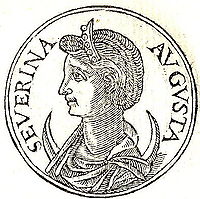- Marina Severa
-
Marina Severa († before 375) was the Empress of Rome and first wife of Emperor Valentinian I. She was the mother of later Emperor Gratian.
Contents
Name
Her full name is not actually known. Marina Severa is a combination of the two names given in primary sources. Socrates of Constantinople calls her "Severa" while John Malalas, the Chronicon Paschale and John of Nikiû name her "Marina".[1]
Life
Marina Severa married Valentinian before he ascended to the throne. Their son, Gratian was born in 359 at Sirmium in Pannonia. Valentinian was chosen emperor in 364. He divorced his wife around 370 to marry Justina, widow of usurper Magnentius.[2]
According to Socrates of Constantinople: "Justina being thus bereft of her father, still continued a virgin. Some time after she became known to Severa, wife of the emperor Valentinian, and had frequent intercourse with the empress, until their intimacy at length grew to such an extent that they were accustomed to bathe together. When Severa saw Justina in the bath she was greatly struck with the beauty of the virgin, and spoke of her to the emperor; saying that the daughter of Justus was so lovely a creature, and possessed of such symmetry of form, that she herself, though a woman, was altogether charmed with her. The emperor, treasuring this description by his wife in his own mind, considered with himself how he could espouse Justina, without repudiating Severa, as she had borne him Gratian, whom he had created Augustus a little while before. He accordingly framed a law, and caused it to be published throughout all the cities, by which any man was permitted to have two lawful wives." [3]
This account was dismissed by later historians whose interpretation of it was an unlikely legalization of bigamy. However Timothy Barnes and others consider this decision to only allow various Romans to divorce and then remarry. The controversy being that Christianity had yet to accept the concept of a divorce. Barnes considers that Valentinian was willing to go forth with the legal reformation in pursuit of dynastic legitimacy that would secure his presence on the throne.[4]
John Malalas, the Chronicon Paschale and John of Nikiû report Severa to have been banished because of involvement in an illegal transaction. Barnes considers this story to be an attempt to justify the divorce of Valentinian I without blaming the emperor.[4] According to the account of John of Nikiû: "For this just and equitable emperor hated oppression and judged with the voice of justice and practised equity. This great emperor did not spare (even) his wife, the empress Marina. Now she had bought a garden from a nursery woman (lit. a female planter of plants) and had not paid her the price which it was equitably worth, because the valuers had valued (it) out of regard to the empress and so had inclined to do her a favour. And when the pious Valentinian was apprised of what his wife had done, he sent Godfearing men to value that garden and he bound them by a solemn oath to value it justly and equitably. And when the valuers came to that garden, they found that she had been guilty of a grave injustice and had given the woman but a small portion of the price. And when the emperor heard, he was wroth with the empress (and) removed her from his presence and drove her from the palace and took to wife a woman named Justina, with whom he lived all the rest of his days. As for his first wife, he drove and exiled her from the city, and gave back the garden to the woman who had sold it." [5]
When Valentinian died in 375, he was buried in the Church of the Holy Apostles in Constantinople, next to his first wife.[6]
Royal titles Preceded by
CharitoRoman Empress consort
364–c. 370
with Albia Dominica (364–c. 370)Succeeded by
Albia Dominica and JustinaPreceded by
EutropiaEmpress-Mother of Rome
370–375Succeeded by
JustinaReferences
- ^ Timothy Barnes, "Ammianus Marcellinus and the Representation of Historical Reality" (1998), pages 123-124
- ^ Walter E. Roberts, "Valentinian I (364-375 A.D)"
- ^ Socrates Scholasticus, "The Ecclesiastical History", Book 14, Chapter 31, translation by Philip Schaff (1819 - 1893).
- ^ a b Timothy Barnes, "Ammianus Marcellinus and the Representation of Historical Reality" (1998), pages 123-125
- ^ "The Chronicle of John, Bishop of Nikiu", Chapter 82, verses 9-14, 1916 translation
- ^ Josef Rist (1997). Bautz, Traugott. ed (in German). Valentinian I. (Flavius Valentinianus). Biographisch-Bibliographisches Kirchenlexikon (BBKL). 12. Herzberg. cols. 1055–1060. ISBN 3-88309-068-9. http://www.bautz.de/bbkl/v/valentinian_i.shtml.
External links
Categories:- Roman empresses
- Valentinian Dynasty
- 4th-century deaths
- 4th-century Romans
- Burials at the Church of the Holy Apostles
Wikimedia Foundation. 2010.

